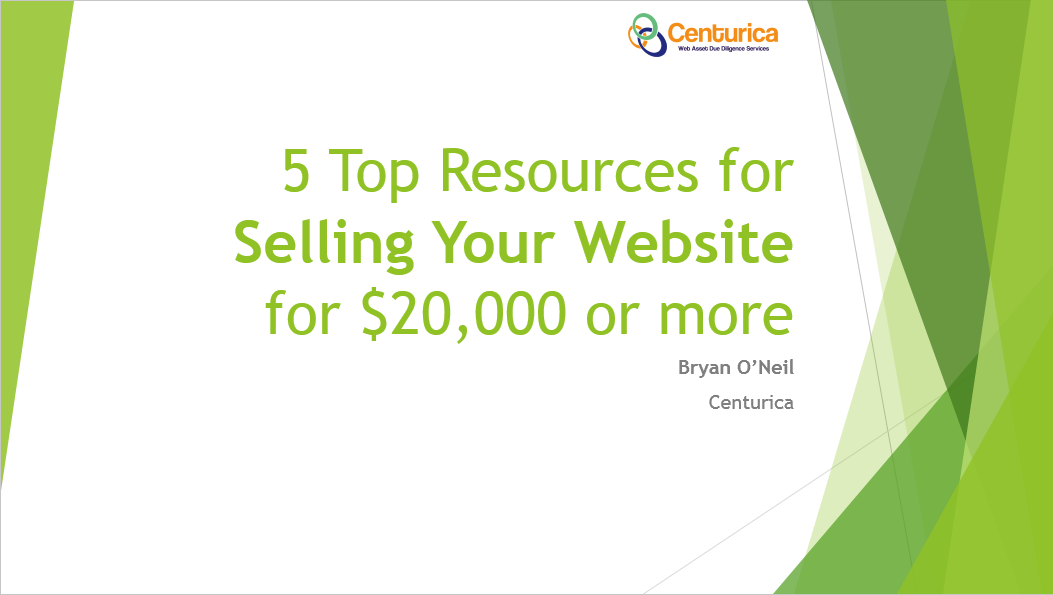11 Steps to Selling Your Website for Profit
So you have a website or an online business and you’re considering selling it for a lump sum of cash that you can invest in your newest venture, or perhaps use it as a retirement fund or to finance that around-the-world trip that you’ve been dreaming of?
It may seem fairly easy and simple, but in reality, there are a number of pitfalls that the majority of first time sellers tend to fall in, resulting in:
– Deals falling through at the last minute
– Getting paid much less than your business is actually worth
– Not being able to find a buyer at all
I have compiled an overview of the most common mistakes made across the industry, accompanied by some tips for preparing yourself and your business for the exit phase, ensuring a smooth transaction and most importantly – making sure that you will get paid a fair price for your property.
1. Start preparing for the exit as early as possible
The majority of issues that lead to difficulties in getting a website sold or to a lower-than-expected price are caused by not being sufficiently prepared.
Because of this, it is incredibly important to start planning the exit as early as possible – preferably at least 6 months in advance – allowing you sufficient time for the necessary preparations.
2. Distance your business from your persona
Regardless of whether your website will be bought by a seasoned investor or by someone looking to take it over and run it as their main business, having it heavily connected with yourself is always an issue.
If your website or its content revolves mainly around you then now is the time to change it. Remove any mugshots that are hard-coded in to the site’s design. Start your YouTube videos with “Hi, I’m John Smith from ABCD.com”, rather than with “Hi! I’m John Smith”, and create a separate email address for your website-related communications, to avoid business emails being mixed with personal ones.
3. Make sure revenue is documented to the finest detail
A major area where online businesses tend to fail in due diligence is not having enough documentation available to prove and verify the revenue that the business has been generating.
If there’s even the slightest chance that you will eventually sell your website then make sure that everything is documented. Not only will it help you immensely in the process of selling your site, but it will likely provide you with valuable insights about your site’s finances, as well.
4. Have proper Analytics tracking in place
Similarly to being able to prove your site’s finances, you need to be able to prove its traffic levels. At this day and age, the vast majority of investors require Google Analytics to be installed on each property that they’re looking to purchase.
This is both because Google Analytics is the most popular analytics suite available, as well as because it is widely regarded as one that can’t be easily manipulated.
Make sure to install Google Analytics on your site early on, as it can’t track your traffic retroactively!
5. Don’t mix business- and personal accounts (or the accounts of different businesses)
For easy verifiability, it is very important to have your website’s revenue run into a dedicated account – be it a bank account, a PayPal account, or an affiliate account. This will help you immensely later on, as having multiple revenue streams pool together into one account often makes it extremely difficult (or impossible) to pinpoint what part of revenue was generated by which site/activity.
In addition to revenue accounts, it is important to keep expense accounts separate. This includes advertising platforms, such as Google AdWords.
6. Document all business relations
If you’re in a business where strategic relationships are a part of your business then make sure to properly document all of them, and whenever possible – have contracts in place.
Even though you may trust your strategic partners and be happy to work with them based on verbal agreements, the potential buyers of your website won’t, turning the lack of proper agreements into an issue that can lower your chances of selling your site or devaluate it.
7. Use a stand-alone web hosting account.
Always try to use a separate web hosting account for each of your sites that you plan to offload at a later date. The added cost is usually negligible, but being able to hand your website over together with the hosting account will likely save many days of hassle and hard work that transferring the site over to the buyer would otherwise require.
8. Keep business communication separate from personal
It’s always a good idea to have a separate mailbox for each business that you own and operate. In many instances, buyers will demand access to any historical email correspondence with clients, suppliers and partners, and having this email correspondence mixed with your personal emails (or those of another business venture) typically results in many days of headache.
9. Get your expectations straight and take broker’s valuations with a pinch of salt.
When preparing your site for sale, it is important to understand what it’s true value is.
Take a look at Centurica’s 2014 Website Buyers Report to get a quick overview of valuations (based on real-life data) across several industries, and once you’re ready to list your property for sale, make sure to take a look at other similar listings to see what a realistic price tag would be.
Bear in mind that while many website brokers are more than happy to provide you with a free valuation, these valuations need to be taken sceptically, as often brokers tend to either over-value your property to get you to sign with them (and will then low-ball you once you have signed exclusivity) or under-value them in the interest of a quick deal.
10. Shop around for a good broker
As I pointed out a few weeks ago in my article entitled How to Tell a Legitimate Broker From a Scam Artist, there are a number of charlatans operating in the industry.
Because of this, you need to be extremely careful when choosing which broker to go with, and not be tricked into signing a long-term exclusivity by the broker promising you an unrealistically high price or a low commission percentage.
11. Don’t neglect your business while in the process of selling it
Probably the biggest mistake that a seller can make is listing their website for sale, and simultaneously forgetting to take care of it! It may sound like a no-brainer, but in my 4 years in the industry I have encountered this numerous times.
As investors are valuing your business based on its current and historical performance (not only its historical performance), it is crucially important to keep taking good care of the business while it’s listed for sale – as even the smallest decrease in revenues will nearly always result in a lower price.







